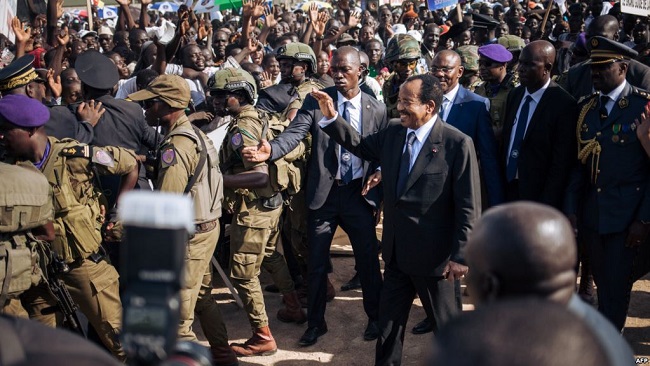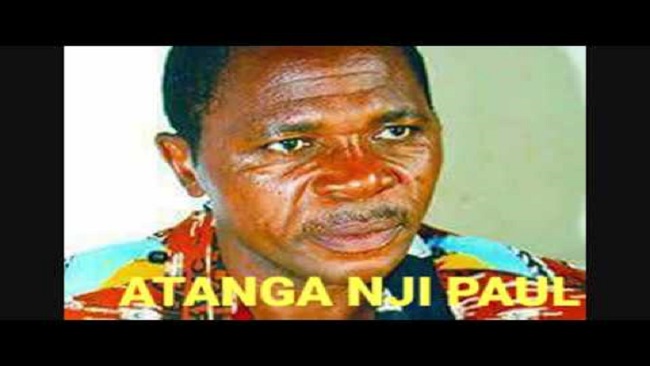25, January 2019
Biya owes much of his survival to a longstanding relationship with various French gov’ts 0
On 6 November 2018, 85-year-old Paul Biya was sworn in for his seventh term as president of Cameroon, extending his 36-year rule. It is remarkable, more so considering that up to 60 per cent of the population is below the age of 25. It means that the vast majority of Cameroonians have never known a president other than Biya and have never lived through a truly free and fair election, where anyone other than Biya could win.
The question of longevity in office has been a focus for political organizing in many parts of the world since the 1990s, when one-party regimes fell apart – unable to sustain themselves after the Cold War. Many of the long-serving leaders of that era owed their survival to client relationships with the US and the Soviet Union. When the superpowers no longer needed them, there was finally enough space for democracy to take root. Only a handful of countries in Africa and Asia have resisted this transition, and the case of Paul Biya highlights why.
In crude terms, Cameroon was a second-tier state that was more interesting to secondary Western powers – namely France – than it was to either the US or the Soviets. Indeed, Biya owes much of his survival in power to a longstanding relationship with various French administrations. As such, despite the cloud of violence surrounding this latest election, France’s president Emmanuel Macron was one of a handful of leaders who congratulated Biya on his election victory in a letter (which Biya published on his Facebook page) that the Élysée claimed was supposed to remain private.
Nor have other nations made any tangible moves to distance themselves from Biya. Despite the mounting domestic resistance to his regime, particularly in the Anglophone region of the country, Biya travels the world freely. He frequents the InterContinental hotel in Geneva, where Cameroonians allege he spends more time than in Yaoundé. He regularly attends African Union Heads of State meetings and recently turned a three-day Africa-China summit in Beijing into a two-week trip.
When a president has been in power for 36 years in a country where elections should nominally change the leadership, it’s logical to ask, ‘Why aren’t the locals resisting?’ But in Cameroon, regional and international institutions do their best to nullify any local resistance. The army and the police have a nominal monopoly on the use of force and a relatively limitless access to weapons, training and other tools. And because the arms trade remains one of the least regulated industries in the world, after a while the only recourse left for those who resist is armed conflict, if the central state is unwilling to negotiate.
Thus, in 2015, citizens in the Anglophone region of Cameroon began a peaceful campaign to protest poor access to government services. That protest was met by violence from the army and the state, and has since morphed into a full rebellion. A secessionist campaign has been brutally countered by state violence and collective punishment of civilians. But this information is broadly kept out of the mainstream media by restricting access to the restive regions. By controlling how information about Cameroon is created and disseminated, Biya manages to shield the country from scrutiny, leaving Cameroonians to resist his regime by themselves.
Never-ending presidential terms are a hot topic right now in Africa, with the youngest population in the world, and in Cameroon, with a gap between an 85-year-old president and a population with an average age of 18.5, it looks particularly absurd. Biya’s Cameroon highlights that change is not just about sheer demographic numbers but power, violence and political institutions. Longevity is also a chance to ask important questions about the international systems that connect and sustain regimes around the world.
Source: New Internationalist

























25, January 2019
Conflicts and corruption in Cameroon drain the economy 0
Cameroon is finding it difficult to meet its financial commitments as the battle against armed separatists and corruption depletes the country’s resources.
In addition to corruption and the battle against separatists fighting to create an English-speaking state, there is also the war against Boko Haram on Cameroon’s northern border with Nigeria and the spillover of the crisis in the Central African Republic (CAR). All of these combined are draining the state of its resources.
Employees of a company constructing the Paul Biya Stadium in Olembe, on the outskirts of Yaounde, protested against difficult working conditions and non-payment of their salaries. Their spokesperson Dieudonne Nguidjol demanded that they be given a normal contract. “We are supposed to work from 7:30 a.m. to 4:00 p.m. [and] 4:00 p.m. to 6:00 p.m. is supposed to be extra time. Our salaries are not good,” said Nguidjol.
He added that people who come to work as engineers earn a salary of about 80,000 CFA francs (about €120, $138), which is not in line with Cameroon’s labor code. “We have salaries of four, five and six months that have not been paid; this is the immediate cause of this strike,” Nguidjol said. Cameroon’s Minister of Finance Louis-Paul Motaze said the stadium is just one project that has been affected by the conflicts affecting the country. He said the treasury is stretched with requests for funds for development projects and money to fund the conflicts. “The people want roads. They want security. They want energy. They want agricultural products. We have to realize them with revenues. That means that we have to look for internal revenues. Those internal revenues are taxes. But we have to consider the expenses,” Motaze said.
Cameroon will no longer host the 2019 Africa Cup of Nations (AFCON)
Financial scandal
The 2019 Africa Cup of Nations (AFCON) project was one of the largest projects recently rocked by a financial scandal in Cameroon. The country was stripped of its hosting right in favor of Egypt due to massive delays in the preparations. Whistleblowers claim that an estimated 1.8 billion euros of Cameroonian public money has been swallowed in contracts shrouded in controversy. A video of a Cameroonian official allegedly defending why a bag of cement costs 15,000 CFA francs for the AFCON project, instead of the normal 4,500 CFA francs, went viral on social media.
Ako John Ako, a university lecturer and civil society activist in Cameroon, said that the prices of the 2019 AFCON infrastructure were ten times more than is usual for the same kind of infrastructure in other African nations. “Findings indicated that public contracts suffered one of the highest hits,” Ako said. “Within Cameroon, those who implement decisions or grant the order for contracts always have a percentage reserved in their name.”
Corruption kills infrastructure
Government ministers, heads of parapublic and public as well as giant private enterprises are increasingly being brought down as Cameroon’s anti-corruption organ intensifies its efforts. According to the National Anti-Corruption Commission’s (CONAC) most recent report, the country saw 375 billion CFA francs returned to its coffers.
Doula is Cameroon’s biggest city and its economic capital Despite these efforts, civil society actors like Ako think that CONAC, other anti-corruption agencies and poor governance remain key factors in holding back Cameroon’s development.
“CONAC and many other agencies that have been created by the state simply come to confirm that Cameroon will solve problems with commissions, but then more often than not most of the commissions created are still a problem and center for corruption within Cameroon,” he told DW. Ako went on to say that the Cameroonian government could say that the fight against corruption has been succeeding, because Cameroon does not appear among the first five most corrupt nations in the world. “But corruption still continues to be the venom that is eating and killing the infrastructure and implementation or execution of state activities,” he said.
Threat of famine
The situation in the English-speaking regions, where suspected separatists have been carrying out attacks and kidnappings, is dire. Dominic Asah, one of the supervisors of government development projects, said that up to 20 percent of planned projects could not be implemented due to insecurity and shortage of liquidity. “The socio-political climate in the field is actually what is hampering the execution process in these localities. The northwest region received a total of 490 operations. Only 52 have been executed, 69 are ongoing and 311 are still to take off the ground,” Asah said. At least 10,000 workers have quit their jobs in rubber plantations in the English-speaking town of Buea. According to director general Frankline Njie, they require at least 54 million dollars. “None of our rubber estates is operating normally. Some are shut down completely, the workers are threatened,” Njie lamented.
He said it was difficult for him to understand and accept why all this pain was being inflicted. “The banana sector has been hit. One of our pack houses, where bananas are processed for export was attacked and set ablaze.” President Paul Biya has openly called on all fighters to drop their guns and has created a national disarmament commission to socially reintegrate fighters who surrender.
Source: DW.Com